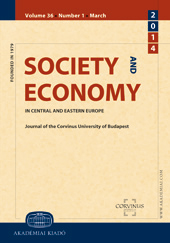Efficiency or effectiveness? The Hungarian practice of using the EU funds
Efficiency or effectiveness? The Hungarian practice of using the EU funds
Author(s): Sándor Gyula NagySubject(s): Economy, National Economy, Supranational / Global Economy, EU-Approach / EU-Accession / EU-Development, Socio-Economic Research
Published by: Akadémiai Kiadó
Keywords: EU Structural Funds; efficiency; effectiveness; measurement; Hungary;
Summary/Abstract: Efficiency or effectiveness? It not just the matter of definition. Experts and researchers have to make a difference between the qualitative and quantitative approach. The efficiency of EU subsidies means the ratio of the committed and disposable amount of EU subsidies can be measured, which was used and paid out within the given timeframe and along the legal regulations. The effectiveness of EU subsidies needs a much more complicated and complex approach than efficiency. The effectiveness of usage on a project level can be measured by the ‘added value’ of the project; and on the programme level by the added GDP growth or employment rate. The following research essentially analyses the project level or micro-effectiveness, however, it discusses the results of some macro-analyses as well (qualitative approach).
Journal: Society and Economy. In Central and Eastern Europe ǀ Journal of the Corvinus University of Budapest
- Issue Year: 30/2008
- Issue No: 2
- Page Range: 259-274
- Page Count: 16
- Language: English

